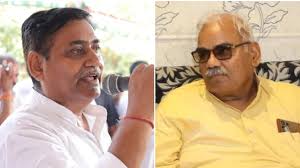Rajasthan minister seeks removal of books that glorify Gandhis; Congress slams ‘ideological attack’

Rajasthan’s Education Minister Madan Dilawar has stirred a political storm by demanding the removal of school books that “glorify the Gandhi family.” His remarks sparked strong opposition from the Congress party, which accused the BJP of launching an ideological attack on Indian history.
BJP Minister Criticizes Textbooks
Madan Dilawar, a senior BJP leader, alleged that school books in Rajasthan focus too heavily on the Nehru-Gandhi family. He referred to Jawaharlal Nehru, Indira Gandhi, Rajiv Gandhi, and Sonia Gandhi as examples.
“These books promote one family,” Dilawar told reporters. “Our children should learn about all great leaders, not just those from a single political background.”
He stated that the government would review the textbooks taught in state-run schools. The goal, he added, is to ensure balanced historical representation without political bias.
Congress Reacts Strongly
The Congress party condemned Dilawar’s statement, calling it politically motivated. Rajasthan Congress chief Govind Singh Dotasra said the BJP is targeting the Gandhi family instead of focusing on real educational issues.
“They want to erase the legacy of India’s first Prime Minister and other Congress leaders,” Dotasra said. “This isn’t just about books. It’s about controlling how future generations view India’s past.”
Senior Congress leader Jairam Ramesh accused the BJP of replacing facts with propaganda. “The BJP fears truth in history,” he tweeted.
Academics Warn Against Political Interference
Several historians and education experts raised concerns over the move. They believe political agendas should not dictate what children study in schools.
Dr. Anjali Maheshwari, a Jaipur-based historian, criticized frequent syllabus changes. “When each government rewrites history, students suffer,” she said. “Education should be about facts, not party lines.”
She stressed that books must reflect multiple viewpoints and include all significant contributors to India’s story.
Teachers and Students Caught in the Middle
School principals and teachers are also worried. Many say changing books mid-year will affect classroom planning and student learning.
“We already designed our lessons for the term,” said Aarti Verma, a school principal in Kota. “Changing the syllabus now will confuse students and overload teachers.”
Some students expressed frustration. “We want to learn, not watch political fights,” said Ritesh Singh, a 10th-grade student from Ajmer. “Why remove leaders from our books? We should know about everyone who shaped the country.”
A National Pattern?
This is not the first time a BJP-ruled state has revised textbooks. Similar changes have happened in Gujarat, Uttar Pradesh, and Madhya Pradesh.
In some cases, references to Nehru, secularism, and Mughal rulers were removed or changed. Critics believe these moves are part of a larger plan to rewrite India’s history with a nationalist tone.
Political analyst Zafar Moinuddin pointed out that education is becoming a tool for shaping public opinion. “BJP wants history to reflect its version of India,” he said. “This goes beyond Rajasthan. It’s a national trend.”
Congress Defends Gandhi Family’s Role
Congress leaders continue to highlight the Gandhis’ contributions. They argue that removing their names from history is unfair and dishonest.
“Jawaharlal Nehru laid the foundation of modern India,” said Congress MP Shashi Tharoor. “Indira Gandhi led the country during a critical war. Rajiv Gandhi brought the technology revolution. These facts cannot be ignored.”
The party submitted a memorandum to the Governor. They demanded that no changes be made without consulting historians and education experts.
Government Yet to Issue Formal Order
So far, the Rajasthan government has not released any official directive on textbook removal. However, the education department has started consultations.
Minister Dilawar insists the review is academic, not political. But many believe the process could open the door to major changes.
Conclusion
The controversy over textbooks in Rajasthan reflects a deeper struggle over who controls India’s narrative. While the BJP accuses Congress of promoting one family, the opposition fears history is being rewritten to erase uncomfortable truths.
As this debate continues, students and educators are left hoping for stability and honesty in what they teach and learn.






